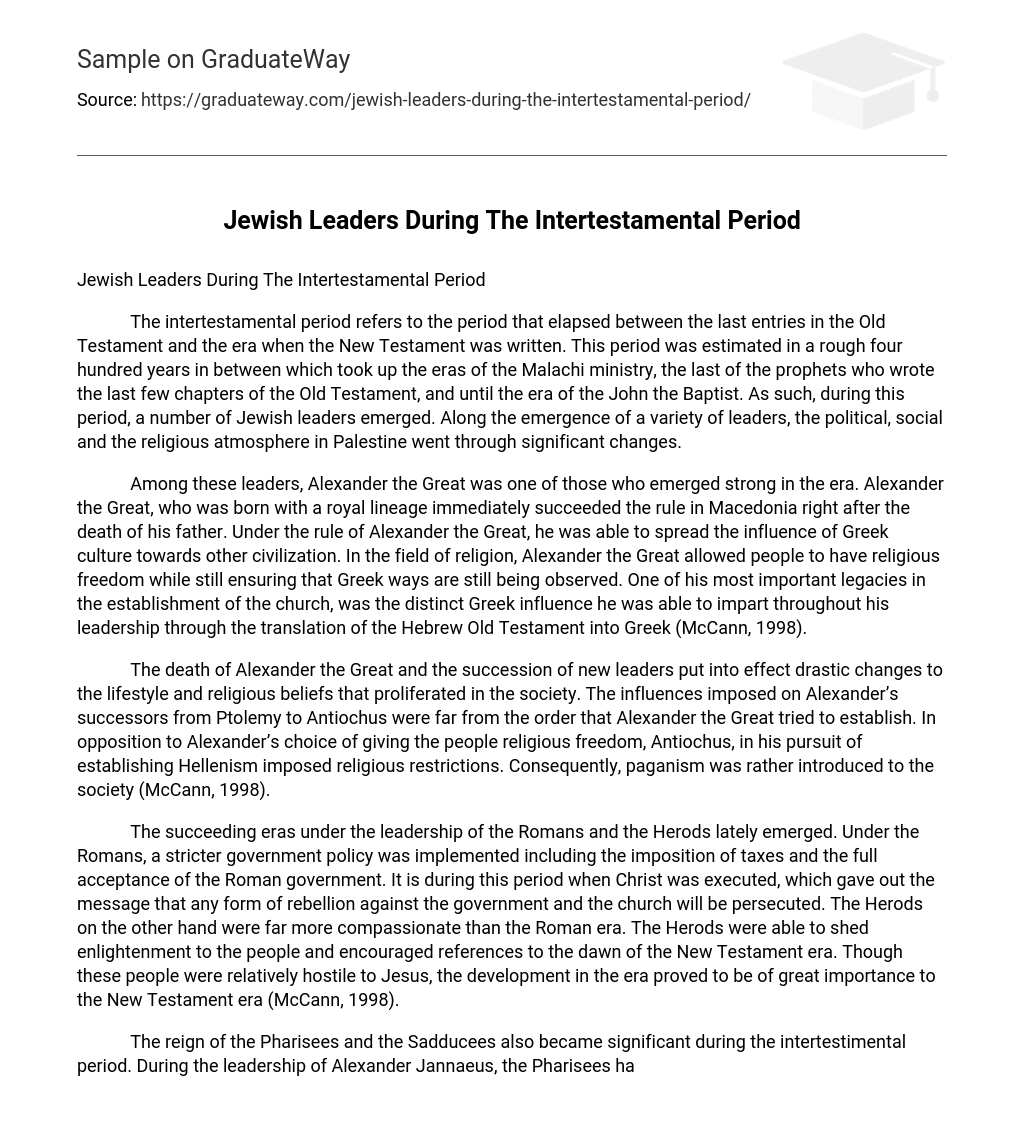The intertestamental period refers to the period that elapsed between the last entries in the Old Testament and the era when the New Testament was written. This period was estimated in a rough four hundred years in between which took up the eras of the Malachi ministry, the last of the prophets who wrote the last few chapters of the Old Testament, and until the era of the John the Baptist. As such, during this period, a number of Jewish leaders emerged. Along the emergence of a variety of leaders, the political, social and the religious atmosphere in Palestine went through significant changes.
Among these leaders, Alexander the Great was one of those who emerged strong in the era. Alexander the Great, who was born with a royal lineage immediately succeeded the rule in Macedonia right after the death of his father. Under the rule of Alexander the Great, he was able to spread the influence of Greek culture towards other civilization. In the field of religion, Alexander the Great allowed people to have religious freedom while still ensuring that Greek ways are still being observed. One of his most important legacies in the establishment of the church, was the distinct Greek influence he was able to impart throughout his leadership through the translation of the Hebrew Old Testament into Greek (McCann, 1998).
The death of Alexander the Great and the succession of new leaders put into effect drastic changes to the lifestyle and religious beliefs that proliferated in the society. The influences imposed on Alexander’s successors from Ptolemy to Antiochus were far from the order that Alexander the Great tried to establish. In opposition to Alexander’s choice of giving the people religious freedom, Antiochus, in his pursuit of establishing Hellenism imposed religious restrictions. Consequently, paganism was rather introduced to the society (McCann, 1998).
The succeeding eras under the leadership of the Romans and the Herods lately emerged. Under the Romans, a stricter government policy was implemented including the imposition of taxes and the full acceptance of the Roman government. It is during this period when Christ was executed, which gave out the message that any form of rebellion against the government and the church will be persecuted. The Herods on the other hand were far more compassionate than the Roman era. The Herods were able to shed enlightenment to the people and encouraged references to the dawn of the New Testament era. Though these people were relatively hostile to Jesus, the development in the era proved to be of great importance to the New Testament era (McCann, 1998).
The reign of the Pharisees and the Sadducees also became significant during the intertestimental period. During the leadership of Alexander Jannaeus, the Pharisees had taken an important role in the public affairs. The customs that the Pharisees influenced the people took a large part in the Old Testament and as such, the people started to adopt the practices at hand. On the other hand, the Sadducees acted as the representations of aristocracy and the wealthy priests in the society. The Sadducees were able to impose their influence on the government and the church through the attraction of the wealth that they possess. It is also during this period when organizations of the chief priests became authoritative organizations responsible for monitoring and imposing rules (McCann, 1998).
These personality and groups were among those who were able to impose deep changes that altered and influence the development and activity of the church. The influence imposed during the reign of Alexander the Great responsively changed as different leaders and groups gained ascendance and influence in the society, in particular, the religious beliefs and habits of the people. And until now, certain traces from these civilizations are still visible.
Reference
McCann, V. (1998). In What Ways Does a Knowledge of Intertestamental History and Literature Shed Light on the New Testament Gospels, which a Knowledge of the Old Testament Books Alone Could Not? Spotlight Ministries. Retrieved September 18, 2008, from http://www.spotlightministries.org.uk/inter.htm





